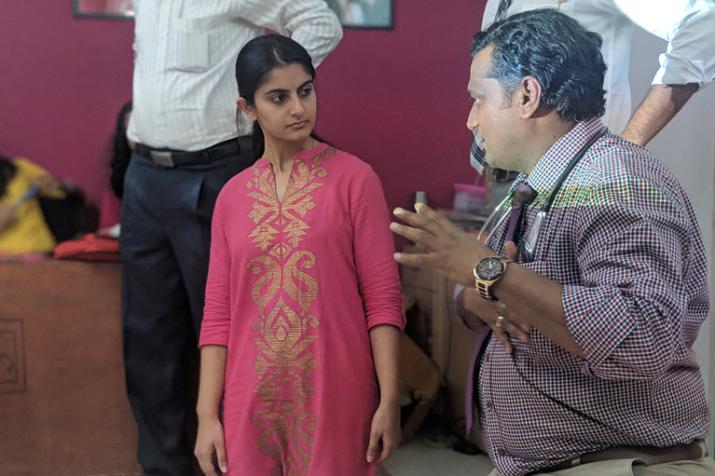
Jalota at CPR training led by Dr. Gautam Bhansali at Myna Mahila's inaugural health camp in December 2018 for the slum residents in Govandi and Shivaji Nagar, Mumbai.
Published January 22, 2019, last updated on April 1, 2020 under Alumni Stories
When global health and economics alumna Suhani Jalota T’16 talks about Uzma, she lights up. Uzma, one of the women working in the social enterprise Jalota founded in Mumbai in 2015, was 17 when Jalota met her. She was the only one in her family who was able to work, but because she was poor, uneducated and painfully shy, she hadn’t been able to find a job. “She wouldn’t even reveal her face to us without a lot of persuasion,” Jalota recalls.
Three years later, Jalota says, “This young woman has become so confident that she’s now one of our highest sellers. She’s talking to strangers about menstrual hygiene when she couldn't even say her name before. She’s even talking to the media—in English—about our organization!”
According to Jalota, all of the 20+ women employed by her social enterprise, Myna Mahila, have transformational stories like Uzma’s. And these women are Jalota’s inspiration and motivation as she jockeys between the roles of full-time PhD student in California and CEO in Mumbai.
We recently talked with Jalota to learn more about her journey with Myna Mahila. Here are some excerpts from our conversation.
DGHI: Tell us about how Myna Mahila came about.
Suhani Jalota: When I started thinking about how I could help women in slum communities in Mumbai about eight years ago, sanitation and health kept coming up as topics that women often ignored. For menstrual hygiene, women used old rags because products were too expensive. This didn’t bother me initially, but as I learned more, it occurred to me that menstrual hygiene was one of many issues that women just aren’t speaking up about.
The women living in these communities are typically very unhealthy, and they have limited access to education or money. Many of them are forced to marry at a young age. They can only go to the bathroom at certain times for fear of being harassed or attacked. I thought, “How can we expect these women to fend for themselves and be productive in society and be able to give it their best when this is their starting point?”
When we started Myna, we knew that what we were really all about was empowering these women. We believe that it starts with how a woman perceives herself, which for these women was not positive. For them to be able to progress in society, that mindset needed to change.
And menstrual hygiene is a very tangible way to get women to start opening up and gain confidence to talk about other things. Menstrual hygiene has been a means to an end for Myna—we’re really focused on a broader mission of empowerment, employment and health.
We called our social enterprise “Myna Mahila” because in Hindi, “myna” is a bird that chirps a lot, and we want these women to talk about these issues that many are afraid to discuss out loud, and “mahila” means “women,” and it’s for these women. “Myna” also sounds like “mahina,” the Hindi word for “monthly” and a euphemism for a woman’s period, so we thought it was a fitting name.
DGHI: How does Myna Mahila help empower women?
Jalota: From the beginning, all of our employees, with the exception of one member of the management team, have been from slum communities in Mumbai. We provide English, life skills and health education classes to these women, and we’ve seen many of them completely transform themselves over the last few years.
When we started, we just had a sanitary napkin unit. We hired women to produce sanitary napkins and distribute them door-to-door in the community. We’re still doing this, but we’ve also started a variety of other activities.
Last spring, we launched our “Sponsor a Girl” campaign, which has actually now become one of our primary activities. The women in our program are educating girls in slum communities in lots of 50 to 100 every week. We’re talking to them about menstrual hygiene management and other topics, providing one-on-one mentorship, and giving them menstrual hygiene kits. We’re now reaching out to girls in orphanages and underprivileged schools, where there are huge unmet needs. We’ve reached more than 1,000 girls through this program so far.
Seeing the impact “Sponsor a Girl” has had on the girls has definitely been the most rewarding for me, as well as everyone else in the organization. The smiles on their faces and hearing their comments, like “I had no idea this is what was happening to me! I had no idea I could actually ask for this!” inspired us to do a lot more of these types of events where we were directly in touch with the community.
We’ve also established a Myna boutique. The Myna women use free scrap cloth from a local textile factory to sew items like menstrual pad pouches, laptop bags and pencil pouches, and we display and sell the products in kiosks at various college campuses.
Last year we introduced a biannual health camp, which is an opportunity for us to identify what illnesses and issues people in the community are experiencing and figure out where we might want to concentrate our efforts. We invite gynecologists to come to help women with menstrual hygiene related problems, but other types of doctors come as well. We provide free medications and healthy food. At our last health camp in December, we served more than 300 patients.
Another new activity we started last year, which we plan to make an annual event on our anniversary, July 6, is the Myna Menstrual Hygiene Conference. Through this conference, we engage stakeholders outside of the slum in dialogue around women’s health. In 2018, we had UN members, government officials, NGOs, corporations, community members and leaders present in panels. There were more than 100 attendees. We had conversations around menstrual hygiene issues that we were struggling with and we needed some guidance on, like sanitary waste disposal, including differently abled women and men in solutions, and sustainable menstrual hygiene management. We also talked about the new policy in India that exempted sanitary napkins from taxes (Goods & Services Tax), which actually increased costs for sanitary napkin manufacturers in India, driving more imports into the country and driving local manufacturers out.
DGHI: What’s next for you and Myna Mahila?
Jalota: Right now, I’m in a PhD program for health economics at Stanford University. Working at Myna taught me way more than any school has ever taught me, but there were lots of broad scale things about the national healthcare system and the complexities of the supply side that I wasn’t able to understand. I also want to further develop my research and technical skills so we can figure out what interventions work and how they should be implemented. That’s why I decided to pursue this program.
While I’m in school, I’m involved in high-level decisions that have to do with funding and finance and growth, but the rest of my team are managing the daily operations. My mother has started getting more involved as well.
As far as Myna Mahila, we want to grow as an organization that’s providing more employment to more women in these slums and is improving health more broadly for women—wherever that takes us. Our core activities are focused on menstrual hygiene, and we’re thinking about doing something around a women’s entrepreneurship incubator in the slum. We’d like to see how we can support women in earning money and lifting themselves from poverty. Right now, we’re just employing them in our organization and providing some life skills, but we can do better than that.
To learn more about or get involved with the Myna Mahila Foundation, visit their website or reach out by email.


